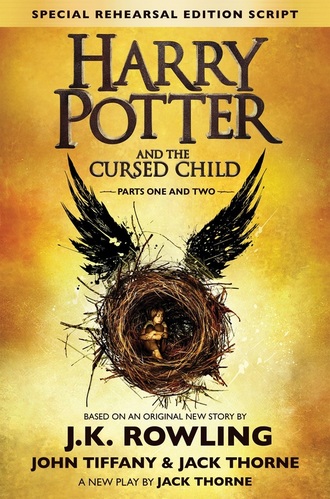Written by Kate McHargue Part of me, really wanted to entitle this article, 'J.K. Rowling and the Cursed Sequel' because this particular entry into Harry Potter's world did not sit well with me, and I'll be happy to explain why, but before we get into that, we’ll begin by reviewing all of the reasons why Harry Potter and the Cursed Child should not change your opinion of J.K. Rowling or the Harry Potter franchise. 1. As with any abomination of a sequel, the poor success of a second installment does not diminish or detract from the sheer brilliance of the original. (i.e. the Star Wars I – III sequel/prequel trilogy, Indiana Jones four, almost every Disney sequel ever made). 2. J.K. Rowling is a co-author of this play and therefore we can only hope that the blame for its disastrous dialogue and plot developments lies mostly with the other two playwrights, Jack Thorne and John Tiffany. 3. Being born of a continued love for the Harry Potter universe and a desire to go back to Hogwarts, the play has moments that almost make it bearable. Almost. All of that being said, this play is nothing more than glorified fan fiction, and the last time glorified fan fiction made this much money and this many headlines… it was entitled 50 Shades of Grey. I will be fair and admit that much like reading Shakespeare’s plays in high school, the experience is better when seeing it performed live as it was always intended. But even granting HP and the Cursed Child this small benefit of doubt does not excuse the blatant bastardization of everything that was wonderful about Harry Potter and the complete dismissal of what makes for a good story. The play revolves around the strained relationship between Harry Potter, the Boy Who Lived, and his youngest son Albus Severus. Albus struggles with the age old conflict of how to live up to his father’s legacy, since he is mocked and ignored for being unlike his father in nearly every way possible. While this is certainly an overdone plot, it is one that, when done well, makes for an engaging story. The power of J.K.’s original work was her ability to explore her characters and their deep seated struggles with identity and purpose. But rather than relying on this character struggle to be enough to drive the story, the play introduces time travel, rushed and unnecessary conflicts, and, the piece de resistance, a love child of Voldemort and Bellatrix Lestrange to serve as our new villain. I’d be lying if I said I didn’t almost throw the book across the room when that last plot twist was revealed. My issue is not with these aspects individually but rather the ludicrous combination of them into a play meant for mass consumption. Individually, these plot developments make for intriguing fan fiction that I would be happy to read during a bout of insomnia at 3 a.m. on a Tuesday. I would not be the first die hard HP fan to enjoy the possibility of an alternate timeline where Hermione Granger is leading the rebel resistance and Ron Weasley is still desperately oblivious of his feelings for her. But the failed attempt to give audiences the next generation of Harry Potter AND the possible what if’s for the first generation AND introduce new villains but with roughly the same conflicts as before is just too much. All in all this play reads more like a Harry Potter fever dream than an actual attempt at good storytelling. I’m all for continuing to explore the Harry Potter franchise. The imminent release of Fantastic Beasts and Where to Find Them has fans foaming at the mouth for a taste of the wizarding world outside of the Boy Who Lived plotline and numerous internet threads have called for a story about the Marauders’ time at Hogwarts or perhaps a “Dumbledore: The Early Years” saga. But Harry Potter and the Cursed Child fails to give us anything new. Instead, it recycles old ideas with poor execution and leaves this Muggle wondering who exactly put a Confundus charm on J.K. Rowling and how she ever thought this play was a good idea.
0 Comments
Leave a Reply. |
Archives
September 2024
|
|
© 2012-2025, Nerds That Geek LLC.
All Rights Reserved. |
uWeb Hosting by FatCow

 RSS Feed
RSS Feed